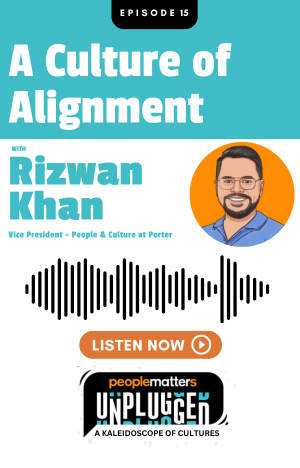Well-being is more than just spending on benefits: foodpanda's Judit Hordai

Over the last few years, companies have been experimenting with assorted approaches to maintaining the mental and emotional well-being of employees, and more recently even their social and financial wellbeing. What works and what doesn't? Whose buy-in is needed? How can wellness be built into the business strategy?
Judit Hordai, Head of People at foodpanda Singapore, told People Matters:
“To invest in the workforce’s well-being is more than just spending on benefits. There needs to be an ongoing assessment and reformation of the fundamental design and management of work to ensure that work-related factors that impede wellness are kept to a minimum.”
foodpanda has been working on various mental wellness initiatives for the last year, and People Matters asked Hordai how things have been going so far.
Strategy driven by employee feedback
“Our mental health support plan and strategy are largely driven by the feedback and sentiment put forth by our pandas, which we collect via a quarterly company-wide survey,” Hordai told People Matters. The accuracy of the surveys comes from the response rate – over 80 percent on the average – and the anonymisation of the responses, which “encourages our employees to be as frank as they’d like in submitting their thoughts,” she said.
“Based on the survey responses, we found that our employees wanted more support for their mental health, and preferred an easy-to-access support channel that they could tap on as and when they needed, at their own convenience.”
foodpanda accordingly formed a regional partnership with mental health tech company Intellect, which provides an app through which users can speak to licensed psychologists and certified behavioural health coaches, and access personalised well-being resources as and when needed. The app was rolled out in a 3-month pilot in April 2021, and employees were then asked to provide feedback.
“98 percent of employees surveyed said they welcomed the Intellect app as a support tool in their daily lives. Today, over 250 employees based in Singapore have registered to use the app,” Hordai said of the results.
The success of that first initiative led to others: foodpanda subsequently adopted meditation and mindfulness app Headspace, and also implemented a series of mental wellness benefits including recharge days, an allowance for wellness activities, and talks and activities to raise awareness and help destigmatise mental wellness.
Creating a culture of empathy and safety
Providing tools and benefits is one thing: employees also need to feel safe enough to actually utilise these benefits. And culture is key to this, Hordai believes.
“Everyone has a part to play in ensuring the mental well-being of themselves, and of their teams,” she said. “From the get-go, we have inculcated a culture where empathy is practiced.”
“Therefore, our stakeholders, which include directors, heads, and team leads, are all aligned that it is an important priority to protect the mental state of employees.”
As such, she added, they are more inclined to support and be involved with initiatives to support mental health in the workplace.
There's more, though: besides having support and involvement from leadership and managers, the daily experience has to be encouraging of people, accepting of the challenges they face, and forgiving of the times when things don't work out. And most of all, leaders must be patient in how they go about creating this environment.
“A culture of trust and psychological safety is built over time,” Hordai explained. “Regular check-ins, reassurance and encouragement are important to build people’s trust and willingness to share about such personal topics.”
“We focus a lot on building a trust-based culture where pandas can express their ideas, opinions freely and are encouraged to take ownership and experiment,” she said. “We don’t just celebrate success but we also “celebrate” failure, as it removes stigma around failure and encourages our pandas to innovate, take calculated risk, and focus on embodying a growth mindset of continuous learning and development.”
The well-being strategy must evolve
As Hordai pointed out, well-being isn't just about spending on static benefits and leaving the menu there. Work must be methodically designed and managed to enable wellness in an ongoing process that involves almost every aspect of the employee's relationship with the company.
“This entails a deeper, more strategic planning to achieve a balance between the organization’s needs, growth, and the workloads and experience of employees. To do so goes beyond managing job scopes and responsibilities - this also includes looking at promotions and pay packages, and even the physical work spaces in the office to ensure an optimal working environment for our pandas,” she said.
For example, foodpanda's wellness strategy has been evolving to encompass the specific stresses related to the remote working model, such as loneliness and the loss of personal connections, especially for international colleagues who may not have their families with them.
“In rolling out our various support initiatives, we need to think of how we can still foster these much-needed connections while still heeding workplace restrictions. We also need to make sure that these initiatives are easily accessible from anywhere and at any time, given that our employees may not necessarily be working from the same location, or are at the same time zones,” she said.
“As such, our well-being strategy evolved to include a mix of mandatory initiatives that all employees have to be a part of, as well as add-ons for those who feel like they need extra support."
"Mandatory initiatives, such as office closures, provide all employees the opportunity to recharge in a way that does not take time away from normal working hours, hence allowing employees to enjoy their downtime with the least distractions from work.”
It's a lot of work, and sometimes the initiatives – such as office closures – may run counter to people's desire to put business at the forefront. But the payoff cannot be discounted, Hordai believes.
“If the design and management of work are not managed well, they can create work-related stress. These work-related factors are more common than we think, and can include unmet job demands, long work-hours, low levels of job control, and lack of recognition and reward – among many other factors,” she observed.
“A healthy workplace has positive impacts on staff morale and engagement, and reduces turnover. At the same time, the organisation is able to retain good talent, and reduces the costs needed to continually hire and retrain new employees.”
This interview was first published in November 2021.













